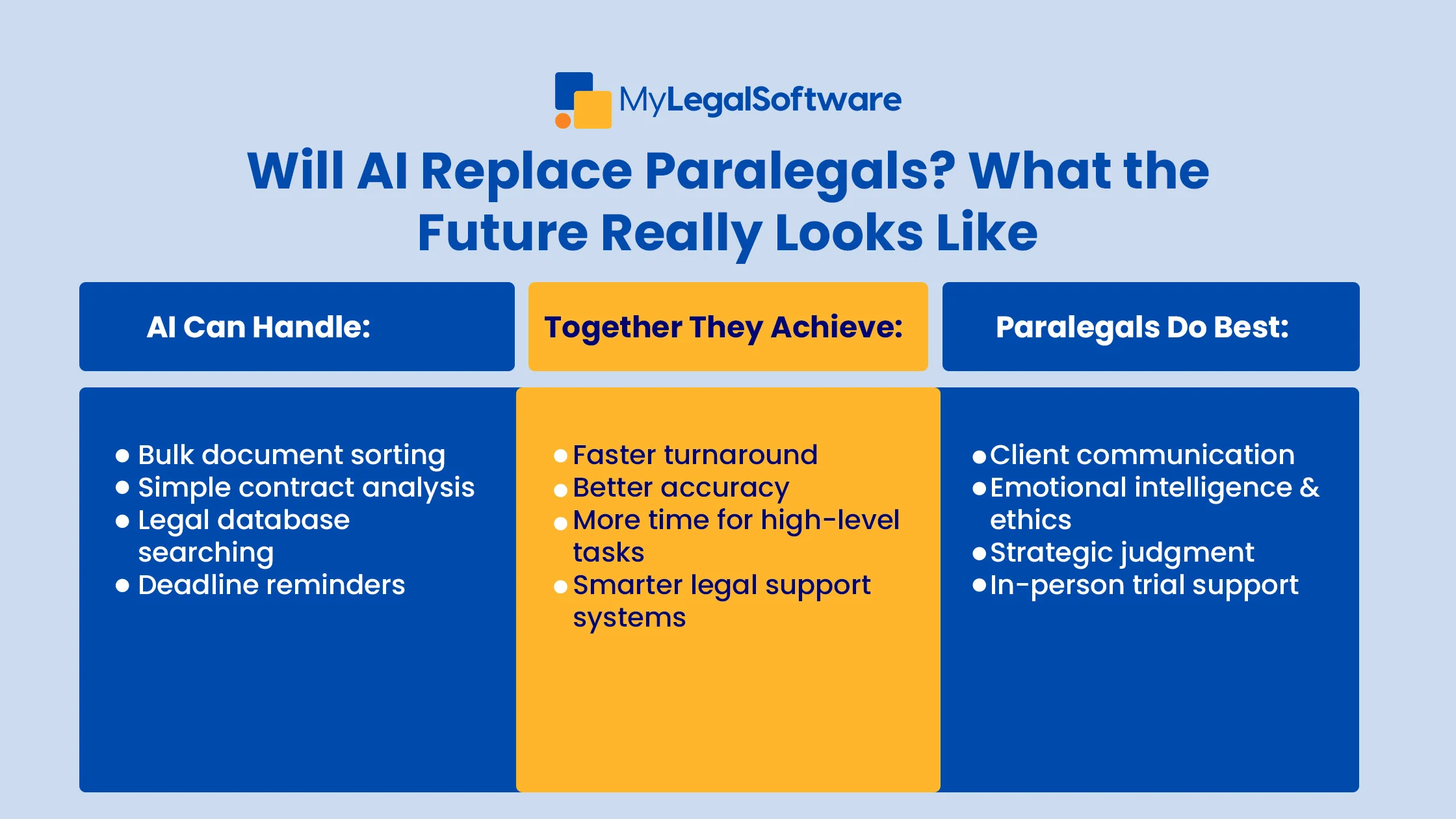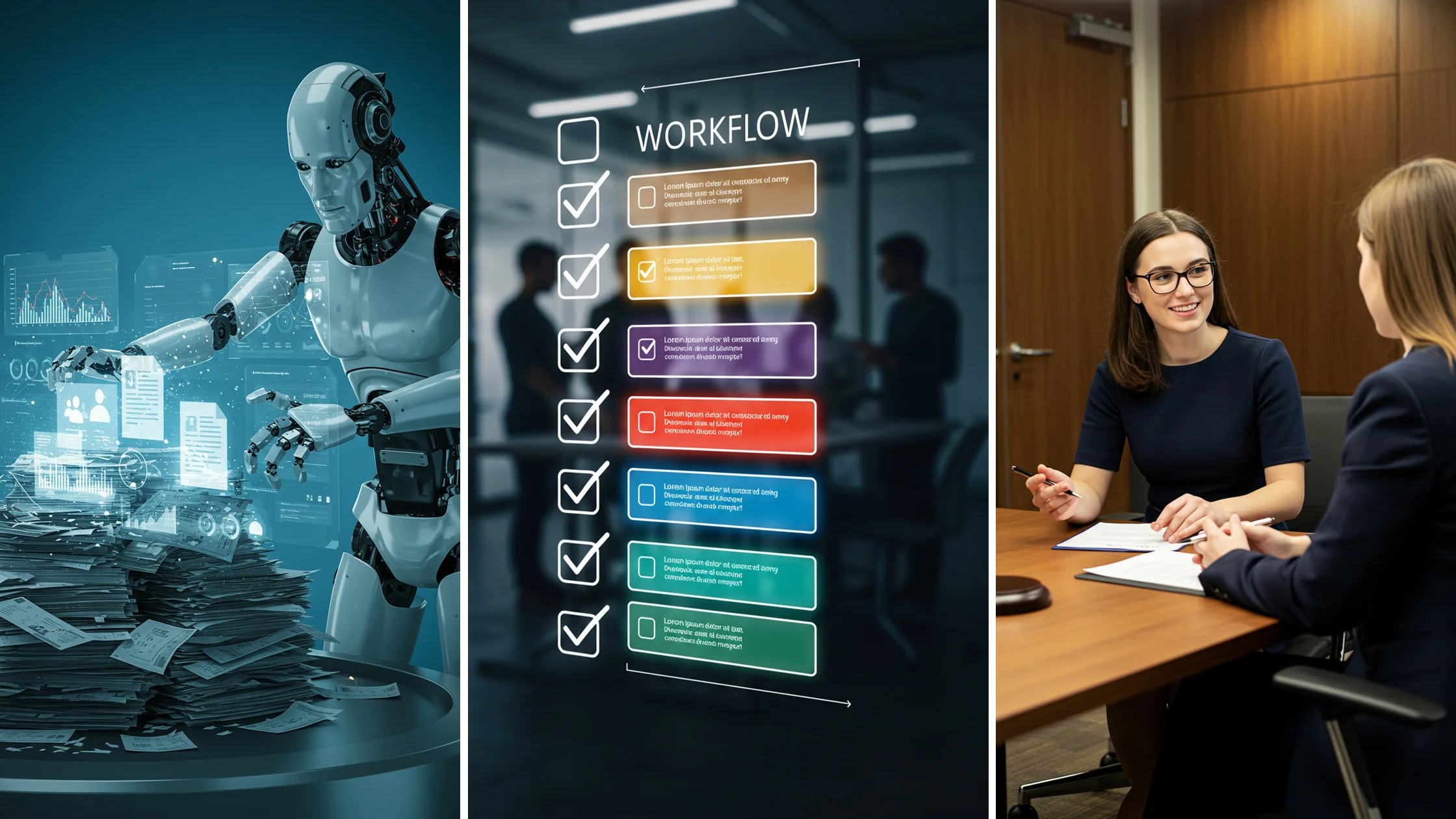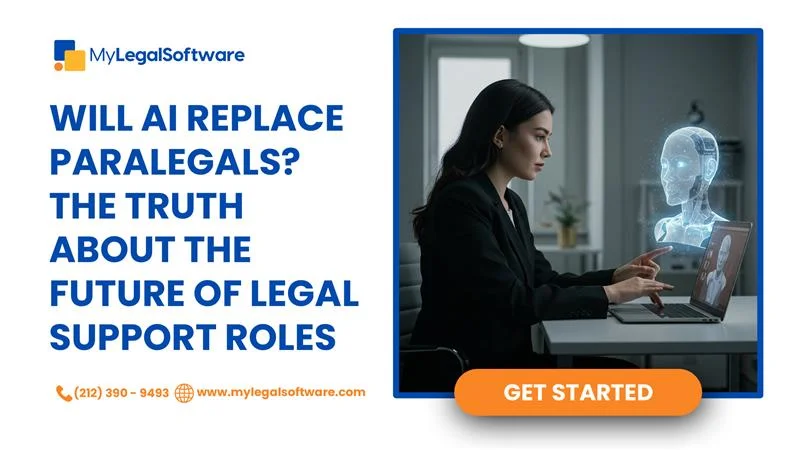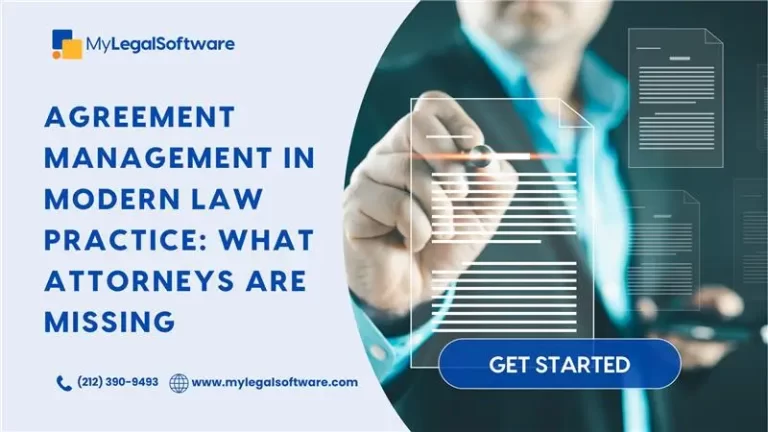The fear of AI replacing paralegals comes more and more often as artificial intelligence becomes a bigger part of the legal world. With law firms adopting AI tools to streamline everything from document review to legal research, it’s no surprise that many paralegals are wondering what this means for their future.
The shift toward automation is undeniable. AI can now easily handle tasks that used to take teams of paralegals weeks to complete. However, while AI can do a lot, it can’t do everything. Instead of replacing paralegals, technology is pushing the profession to evolve in new and promising ways.
In this article, we’ll take a close look at AI in legal practice and what it does, why paralegals remain essential in legal practice, and how the role is changing alongside new tech. So, will paralegals be replaced by AI? Let’s break it down.
The Rise of AI in Legal Work
Artificial intelligence has quickly become a go-to tool for law firms looking to boost efficiency and cut costs. Tasks that once required long hours and large teams can now be completed in record time with AI-powered software.
For example, document review, once a major part of paralegal work, has been transformed by AI. Advanced systems can analyze thousands of pages in just hours, highlighting relevant content for attorneys to review.
Legal research, too, has become faster and more comprehensive, with AI scanning vast databases of laws, cases, and rulings to find relevant precedents and arguments.
Other tools use predictive analytics to assess past case data and help attorneys forecast likely outcomes. Contract review platforms can flag unusual clauses, spot compliance issues, and identify missing elements automatically.
AI is fast, consistent, and tireless. It works 24/7 without breaks, which translates to cost savings and faster turnaround for clients. As a result, adoption continues to grow across the legal industry, from large firms to boutique practices.
What Paralegals Actually Do
It’s easy to assume paralegals just handle paperwork, but that’s far from the full picture. The role involves a wide range of responsibilities that require critical thinking, emotional intelligence, and real-world experience. Paralegals are often the bridge between attorneys, clients, and the courts, juggling both administrative and legal duties.
Some of their key tasks include:
- Conducting legal research and summarizing case law
- Drafting pleadings, motions, and discovery requests
- Managing case files and litigation calendars
- Interviewing clients and witnesses
- Coordinating with expert witnesses and court officials
- Preparing trial exhibits and supporting attorneys in court
- Handling client communications and updates
- Ensuring deadlines and procedures are met
- Reviewing discovery documents
- Maintaining confidentiality and ethical compliance
- Assisting during depositions and trial prep
- Communicating with opposing counsel
Much of what paralegals do involves interpreting nuance, providing reassurance to clients, and making judgment calls /7that depend on experience, not just data. These are things that even the most advanced AI can’t replicate.
Will AI Replace Paralegals? What AI Can and Can’t Do

The answer to this question isn’t straightforward. AI can handle certain types of tasks very well but may fall short when it comes to human judgment and emotional intelligence.
Let’s start with what AI does best: sorting documents, running keyword-based research, summarizing case law, and generating initial drafts using templates. These are repetitive, rules-based tasks that AI can perform faster and with fewer errors than humans.
But the legal world is rarely straightforward. Client meetings often involve sensitive issues. Paralegals need to read between the lines, sense when a client is overwhelmed, and adjust their communication style accordingly. AI lacks this kind of situational awareness and empathy.
Moreover, legal work is collaborative by nature. Paralegals must coordinate with multiple stakeholders, adjust to last-minute changes, and interpret vague instructions from attorneys. They make real-time decisions based on context, instinct, and professional judgment, all of which are still uniquely human skills.
Rather than disappearing, the role of paralegal is expanding. Many are now stepping into hybrid roles that blend legal knowledge with tech, acting as AI supervisors and workflow strategists. So, when we ask, “Will paralegals be replaced by AI?”, the more accurate answer is: they’ll adapt and thrive.
The Role of AI as a Paralegal’s Assistant

Rather than taking over, AI is becoming a powerful assistant to paralegals, one that frees up time and improves productivity without eliminating the human element.
Here’s how that partnership looks in practice:
- Document Review: AI handles the initial screening of documents, flagging what matters. Paralegals then review flagged items for accuracy, relevance, and legal strategy.
- Legal Research: AI provides fast summaries and case references. Paralegals refine the results, verify accuracy, and apply them to specific case strategies.
- Client Communications: AI chatbots can handle basic inquiries or appointment scheduling, leaving complex, emotional, or sensitive conversations to the paralegal.
- Drafting Documents: AI creates the first version of routine documents. Paralegals edit and tailor content to the client’s specific needs.
- Calendar and Task Management: AI tools can track deadlines and send reminders, but paralegals are the ones who prioritize and adjust based on real-time developments.
- Discovery: AI speeds up data sorting, but paralegals ensure nothing is missed and that privileged or strategic materials are handled correctly.
This combination of speed, consistency, and human insight delivers better results than either AI or a person could achieve alone.
Evolving Skills for the Modern Paralegal
As AI becomes more integrated into legal workflows, paralegals are developing new skill sets to stay ahead and indispensable.
- Tech Fluency: Knowing how to use AI tools, research databases, and automated document systems is now essential. Paralegals who can troubleshoot and customize these platforms add major value.
- Data Interpretation: It’s not enough to run an AI report; you need to understand what it’s telling you and how it applies to the case. Paralegals must be able to interpret and act on AI insights.
- AI Oversight: Machines aren’t perfect. Paralegals need to spot AI errors, refine search prompts, and make sure automated tasks meet the necessary quality standards.
- Human-Centric Skills: As more routine tasks get automated, paralegals must lean into the things only humans can do: build trust, show empathy, and handle complex interpersonal dynamics.
The future isn’t just about knowing the law; it’s about knowing how to work with machines while staying rooted in the human side of legal service.
Final Thoughts
So, AI will not replace paralegals. The legal field still needs the judgment, communication skills, and emotional intelligence that only real people bring to the table. But the role of paralegals is evolving fast.
Paralegals who embrace AI and learn how to use it effectively will have a major advantage. They’ll be more productive, more strategic, and more valuable than ever before.
The smartest move isn’t to resist change but to work alongside it. Tools like MyLegalSoftware show what this future can look like: a platform where AI-powered features streamline tasks but where human insight still leads the way. It’s not about replacement; it’s about reinvention.
Frequently Asked Questions
-
-
Will AI replace paralegals entirely in the future?
-
No. While AI is becoming more capable, it can’t replicate human judgment, empathy, or the ability to handle complex client situations.
-
-
What legal tasks can AI do instead of a paralegal?
-
AI can assist with document sorting, legal research, and simple drafting but always needs a human touch to ensure quality and context.
-
-
How can paralegals work with AI tools effectively?
-
By learning how to supervise AI output, use platforms efficiently, and focus on tasks that require human insight and decision-making.
-
-
Is AI already being used in paralegal work today?
-
Yes, many law firms are already using AI for research, drafting, and document review, with paralegals playing a key role in managing those systems.








